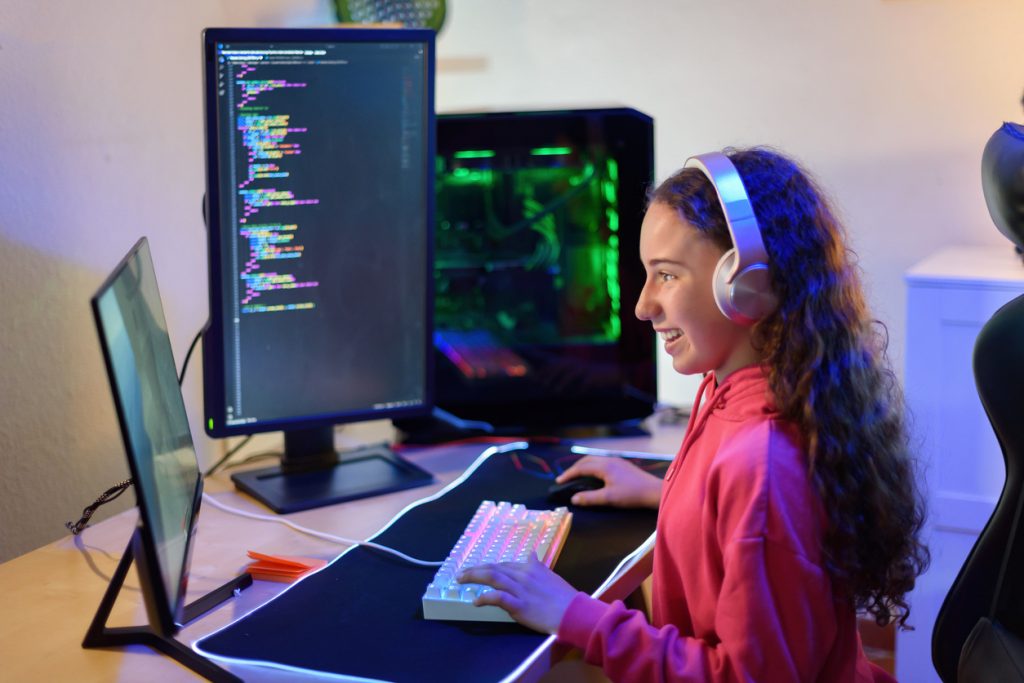It is essential, in this digital century with its constant changes, that children develop skills beyond those learned in the classroom. In this regard, coding games have become a powerful tool for fostering creativity and problem-solving skills in children. While these games are fun and interactive ways for youngsters to engage with technology, they also serve as foundational exercises in developing critical thinking, logical reasoning, and innovation—skills necessary for the 21st century.
The Intersection of Coding and Creativity
At first glance, coding may seem to involve some rigid, rule-based activity that centers on strict algorithms and sequences of commands. It is far from that, coding is an art. Therefore, coding games are just a venue where children can integrate creativity with logic and bring abstract ideas into tangible manifestation.
When children play coding games, they are often given challenges that require innovative solutions. Many of these games give them the freedom to experiment, design their own characters, or construct entire digital worlds, encouraging creativity. This open-ended nature allows them to approach tasks in unique ways, exploring multiple solutions to a single problem. For example, in games like “Minecraft” or “Scratch,” children are not only solving technical problems but also creating intricate designs, animations, and interactive stories. This combination of creativity with logical problem-solving develops their ability to think in both structured and imaginative ways.
Coding games teach kids the very important idea that there is usually more than one way out of a problem by encouraging them to think of their own solution. This is no different from real-life situations where often creativity stands at par with technical knowledge in finding a way out. As they grow in confidence, children come to embrace creativity as an integral ingredient in problem-solving and thus become adaptive, resourceful thinkers.
Developing Problem-Solving Skills Through Coding
Problem-solving is the most important skill kids can gain, and coding games offer the perfect medium for such a skill to be developed. Challenges in these games are meant to be broken down into smaller, manageable steps very basic tenet of logical thinking. Whether it is debugging a simple script or solving a complex puzzle, coding teaches kids to think through problems in a systematic manner.
Games that involve coding generally follow trial-and-error approaches whereby kids can try and fail without any implications in reality. That teaches persistence and resilience because children come to understand that failure is a part of learning. Each mistake thus becomes an opportunity to understand what went wrong and find a better solution. For example, if something in the code does not work, children revisit their thinking process, rethink the logic behind what they did, and may try again. During this process, children strengthen critical thinking processes that are of great value in problem-solving activities not only in coding but even beyond.
Additionally, most coding games foster collaboration. Children often work in teams to surmount challenges, sharing their ideas and strategies. This also develops teamwork, communication, and social skills. Learning to work effectively in a team is another important thing that coding games try to press home in the process of solving problems, thus getting this very child ready for challenges ahead in both higher learning and professional circles.
Another important effect of coding in children is the development of logical thinking skills, which are closely related to problem-solving. While teaching kids to divide complicated problems into smaller ones, which they could easily be able to handle, actually helps them to tackle challenges step by step. As they attempt to do this through coding, their thought processes could become more systematic, hence solving some very complicated problems quite easily.
For parents and educators looking for more ways to nurture problem-solving and logical thinking, check out this helpful guide on nurturing logical thinking for modern learning.
The Role of Coding Games in Fostering Lifelong Learning
One of the major benefits of coding games is that they make learning fun. Children often find conventional ways of learning dull, be it math or science. Coding games, though presenting educational material, come in an interactive and entertaining format, making learning tough ideas fun and engaging.
The reward structure in gaming encourages persistence and curiosity. Children are motivated to continue because they are rewarded through new levels, abilities, or other forms of points, thus creating a continuous feedback loop that will help them build a growth mindset and belief that abilities can be developed through effort and learning. When children realize that they can improve through practice, they become more open to challenges, more willing to experiment, and more resilient in the face of obstacles.
Other things that are great about coding include continuous change, and with this, kids have a chance to implement new technologies that emerge now and then. Coding is one of those fields that keeps on evolving; there is the emergence of new technologies, and the children who start at an early age in coding are encouraged to continuously learn more about it. They can develop and use skills from coding games when growing older by expanding their knowledge and ability to meet new challenges. Many of those children who started with simple coding games went further in learning more complex languages, like Python or JavaScript, which opens the door to advanced problem-solving and real-world applications.
Coding Games as Tools for Emotional and Social Development
Also, regarding emotional and social development, coding plays a huge role. During gameplay, kids are often faced with problems they may often feel frustrated with or difficult to overcome. Learning how to handle frustration, be patient, and be determined to find the solution will help kids further build emotional intelligence. They start to figure out that setbacks are part of the deal and that emotional resilience is key to overcoming obstacles.
Most of the time, coding games include a social component where the players can interact with each other to collaborate, share what they have created, or compete. Such interaction helps a lot in the development of important lifelong skills through teamwork, communication, and empathy among the kids. The children learn in solving problems how community and shared achievement work; thus, teaching the dynamics of how to work in groups.
Final Thoughts
Coding games give kids far more than just fun ways to pass the time. They are also very strong learning tools that help build creativity, problem-solving skills, and a growth mindset. Your child will have the time of his life exploring this area in a fun way while building those skills that will serve them so well in a technologically-based life.
Introducing coding into your child’s daily routine doesn’t have to be overwhelming. With proper facilities and support, including games in coding, parents can help their children develop these much-needed skills in logical thinking, creativity, and emotional resilience. The point is, these aren’t necessarily skills needed for the future but life skills that will benefit them throughout their whole lives.





